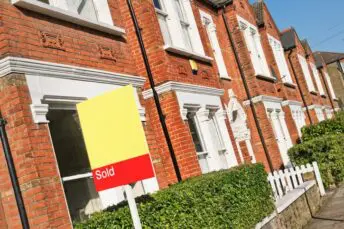House Price Watch Oct 2021
House prices and transactions are up significantly this month. Buyer demand has remained strong, despite the expiry of the stamp duty holiday at the end of September. Competition for a shortage of properties has been intense pushing up prices. Looking further ahead, an expected rise in interest rates may exert a cooling influence on the market in 2022.
What’s happening nationally
House prices are up on average +1.4% in the past month and +9.9% in the past year.
Indices based on:
Land Registry – registered property transactions in September.
Nationwide & Halifax – mortgage valuations in October.
Rightmove – asking prices posted on Rightmove in October.
*Rightmove is not included in the index average as the basis for its index is different (asking price vs agreed sale price)
| Index reports: | Monthly change | Annual change |
|---|---|---|
| Land registry | +2.5% | +11.8% |
| Nationwide | +0.7% | +9.9% |
| Halifax | +0.9% | +8.1% |
| Rightmove | +1.8% | +6.5% |
| Average change | +1.4% | +9.9% |
House prices in your area
House prices have increased in all UK regions,
with the highest rises over the past year in the North West (+16.8%), Wales (+15.4%) and the East Midlands (+14.7%).
London has seen the slowest rise in house prices this year, up just 2.8%; well below the national average.
| UK Region | Average price £ | Monthly change | Annual change |
|---|---|---|---|
| England | |||
| Nothern Ireland | |||
| Scotland | |||
| Wales | |||
| North West | |||
| Yorkshire and The Humber | |||
| North East | |||
| West Midlands | |||
| East Midlands | |||
| South West | |||
| East of England | |||
| South East | |||
| London |
| UK City | Average price | Annual change |
|---|---|---|
Market Monitor
Transactions are up significantly in September.
Buyer demand is up for first time in four months.
Housing stock is further depleted as new seller instructions decline over the past month.
Seller’s market continues with time to sell well below the annual average.
How busy is the market?
- Not busy
- Normal
- Very busy
- Transactions in top 3 busiest months of 2021
- Total number of transactions in September 161K
- +60% from last month
- +68% higher than September last year
Homes for sale vs homebuyers
- Good availability of homes
- Normal
- Shortage of homes
- Buyer enquiries up (+10% RICS); first rise since June
- Seller enquiries down (-20% RICS); seventh month in a row
- Average stock per agent 49; lowest stock in 9 months (incl under offer/ Sold STC Rightmove)
Average speed of sale
- Fast
- Normal
- Slow
- 37 days to find a buyer no change from last month (12 month average 50 days Rightmove)
What the experts say
Rightmove

“Competition for property for sale remains hot this autumn. Although more properties are coming to market, the level is still not enough to replenish the stock that’s being snapped up. Stock shortages started after the first lockdown, and look set to continue with the underlying housing market fundamentals remaining strong, and an additional incentive to buy and fix your mortgage interest rate before a widely expected rate rise. Mortgage interest rates are lower than they have ever been and lenders are keen to lend in a competitive market, with employment and wage growth also robust. The number of sales agreed continue to be strong despite the end of the stamp duty incentives.”
Nationwide

“Demand for homes has remained strong, despite the expiry of the stamp duty holiday at the end of September. Mortgage applications remained robust at 72,645 in September, more than 10% above the monthly average in 2019. Combined with a lack of homes on the market, this helps to explain why price growth has remained robust. The outlook remains extremely uncertain. Consumer confidence has weakened in recent months, partly as a result of a sharp increase in the cost of living. Even if wider economic conditions continue to improve, rising interest rates may exert a cooling influence on the market.”
Halifax

“Since April 2020, the first full month of lockdown, the value of the average property has soared by £31,516 (13.2%). With the Bank of England expected to react to inflation risks by raising rates as soon as next month, and further such rises predicted over the next 12 months, we do expect house buying demand to cool in the months ahead as borrowing costs increase. That said, borrowing costs will still be low by historical standards, and raising a deposit is likely to remain the primary obstacle for many. The impact on property prices may also be tempered by the continued limited supply of properties available on the market.”
Zoopla

“2021 is set to record the strongest year for sales and house price inflation since 2007. This is a result of the ongoing national re-evaluation of housing, low mortgage rates and the additional boost from the extended stamp duty holiday. However, there is clear evidence of slower growth in the value of homes where new sales are being agreed. This marks a turning point for house price growth with a moderation in the rate of price inflation likely in Q4 and as we move into 2022.”
RICS

“Buyer enquiries return to positive growth but still weighing on the market, the lack of available supply continues to present would-be buyers with limited choice, and remains a key factor underpinning strong house price growth.”




